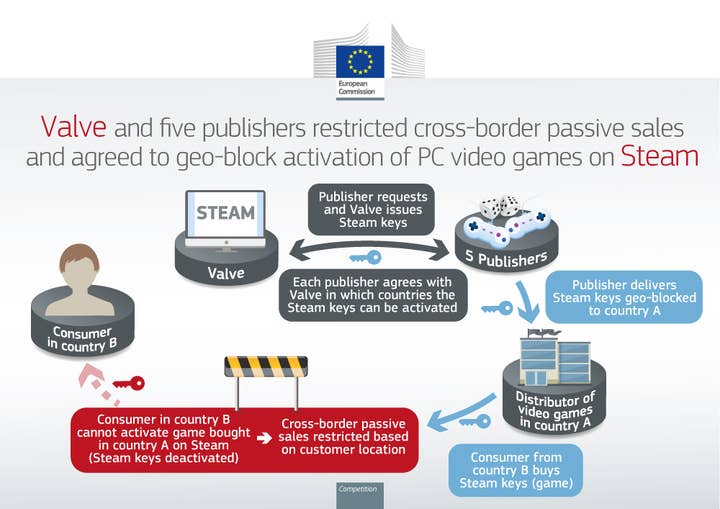Geo-blocking in the games industry -- a closer look at Valve's EC fine
Legal expert Suneet Sharma examines what could be an important benchmark for games publishers selling products in Europe
In January 2021 the European Commission (EC) fined Valve and five video game publishers a total of €7.8 million for breaching EU antitrust rules for entering into geo-blocking practices.
The European Union has had these matters in its focus since March 2015, when it commenced an inquiry into antitrust competition in the European e-commerce market. European Commissioner Margrethe Vestager commented that customers faced too many barriers to buying products cross-jurisdictionally online. She went on to comment that EU antitrust rules would be enforced in the event these barriers were found to result from anti-competitive practices.
Upon its conclusion the inquiry found that 60% of digital content providers who participated in the inquiry had contractually been found to geo-block. Geo-blocking refers to the practice of restricting the accessibility of goods or products in countries or territories.
Collectively, the publishers and Valve were said to have placed geo-blocking restrictions across 100 titles
In the case of Valve, this is primarily to prevent customers from buying products from markets with lower prices. In some content creation companies this allows for content to be targeted to specific territories, or usage of content to be limited to certain territories -- for example, licensed new content to be broadcast only in a certain territory with additional fees for worldwide rights. As such, geo-blocking is common in companies that distribute content.
It is in this context that the European Commission launched its investigation into Valve in February 2017. The focus here was the content of bilateral agreements that Valve had entered into with video game publishers, which purported to contain anti-competitive measures.
In April 2019 the EC sent Statements of Objections to Valve, via Steam, and five video game publishers it had been trading with: Bandai Namco, Capcom, Focus Home Interactive, Koch Media and ZeniMax. These alleged that the publishers had entered into agreements containing contractual export restrictions, and used geo-blocked activation keys to prevent cross border sales.

All five game publishers indicated their intent to comply with the investigation, benefiting from the 10% reductions in any potential fines mandated for compliance. In contrast, Valve revealed its intention to not comply with the EC's investigations. Collectively, the publishers and Valve were said to have placed restrictions across 100 titles.
The fines
All this came to a head this January, with the EU Commission fining Valve €1,624,000 -- the first fine of its kind for a gaming company. Fines for the publishers were also announced:
- Bandai Namco: €340,000
- Capcom: €396,000
- Focus Home: €2.888,000
- Koch Media: €977,000
- ZeniMax: €1,664,000
These fines were assessed by a percentage of the value of the annual sales of the products concerned. The percentage of the fine can be up to 30% of the value of sales in question, depending upon the seriousness of the infringement, multiplied by the duration in years, plus 15 to 25% of relevant sales. Factors included are broad, such as the nature of the infringement, geographic scope and implementation. The fine is capped at 10% of turnover per infringement.
The value of these fines can be in excess of millions of euros, and such figures are not uncommon from the EU Commission
As you can see, the value of these fines can be in excess of millions of euros, and such figures are not uncommon from the EU Commission. Clothing retailer Guess was fined €40 million previously for restricting online sales. However, geo-blocking practices are a new area for the Commission, and these fines set a significant benchmark across the industry.
Vestager commented: "More than 50% of all Europeans play video games. The video game industry in Europe is thriving and it is now worth over €17 billion.
"Today's sanctions against the 'geo-blocking' practices of Valve and five PC video game publishers serve as a reminder that, under EU competition law, companies are prohibited from contractually restricting cross-border sales. Such practices deprive European consumers of the benefits of the EU Digital Single Market, and of the opportunity to shop around for the most suitable offer in the EU."
A note on the law
The Commission applied Article 101 of the Treaty on the Functioning of the European Union ("TFEU") and Article 53 of the Agreement on the European Economic Area in concluding the activities of Valve and the publishers' mandated fines. This is separate from the new geo-blocking focused Regulation 2018/302 on unjustified geo-blocking.
Valve is fighting back
Valve's lack of cooperation is notable here. Commenting to Eurogamer, it stated: "The EC's charges do not relate to the sale of PC games on Steam -- Valve's PC gaming service. Instead, the EC alleges that Valve enabled geo-blocking by providing Steam activation keys and -- upon the publishers' request -- locking those keys to particular territories ("region locks") within the EEA. Such keys allow a customer to activate and play a game on Steam when the user has purchased it from a third-party reseller. Valve provides Steam activation keys free of charge and does not receive any share of the purchase price when a game is sold by third-party resellers (such as a retailer or other online store).
Where Valve is providing a reseller with free geo-blocked Steam keys, it does not believe it can be held liable for this breach
"The region locks only applied to a small number of game titles. Approximately just 3% of all games using Steam (and none of Valve's own games) at the time were subject to the contested region locks in the EEA. Valve believes that the EC's extension of liability to a platform provider in these circumstances is not supported by applicable law. Nonetheless, because of the EC's concerns, Valve actually turned off region locks within the EEA starting in 2015, unless those region locks were necessary for local legal requirements (such as German content laws) or geographic limits on where the Steam partner is licensed to distribute a game. The elimination of region locks may also cause publishers to raise prices in less affluent regions to avoid price arbitrage. There are no costs involved in sending activation keys from one country to another, and the activation key is all a user needs to activate and play a PC game."
Essentially, where Valve is providing a reseller with free geo-blocked Steam keys, it does not believe it can be held liable for this breach of Article 101 TFEU, even if this results in anti-competitive outcomes.
This is an interesting proposition grounded in the principle of vicarious liability in EU competition law. In these circumstances, can Valve be held liable for the anti-competitive actions of a publisher? Or was the issuing of the geo-blocked steam keys at the request of the reseller in and of itself anti-competitive?
Previous cases seem to suggest that a narrow approach is taken to imposing liability on a seller where the actions of a reseller are anti-competitive. The Court of Justice of the European Union has acknowledged in VM Remonts and Others -- C-542/14, EU:C:2016:578 -- that a client who hired a third-party services provider which engaged in anti-competitive behaviour could be held liable if:
- the service provider was in fact acting under the direction or control of the undertaking concerned, or
- that undertaking was aware of the anti-competitive objectives pursued by its competitors and the service provider and intended to contribute to them by its own conduct, or
- that undertaking could reasonably have foreseen the anti-competitive acts of its competitors and the service provider and was prepared to accept the risk which they entailed.
Valve further stated that the elimination of region locks may cause publishers to raise prices in less affluent regions to avoid price arbitrage. But in the event publishers cannot annex countries to allow for pricing fluctuations depending on customer buying power, they will likely resort to selling their products for a sometimes-higher recommended retail price across the EU. This ensures that they retain profits that would otherwise be lost from customers shopping around and getting the best deal across the Digital Single Market. Essentially this boils down to a long-debated impact of the DSM, a potential increase in the prices paid by consumers in a bid to save revenues that would otherwise be lost but for anti-competitive practices such as unjustified geo-blocking.
However, unsolicited customer sales (also known as passive sales) in jurisdictions such as Czechia, Estonia, Hungary, Latvia, Lithuania, Poland, Slovakia and Romania were found to be restricted in Valve's case -- a serious hallmark of anti-competitive behaviour. This seriously undermines the approach envisaged by the Digital Single Market, where customers can shop around different countries for the best offer available.
As such, it appears Valve's arguments aren't without their weaknesses. Further, it offers no defence for the bilateral agreements it entered into with resellers which were also found to be anti-competitive. More will become clear once the EC publishes its reasoning behind its findings in the next few months.
Suneet Sharma is a legal professional and creator of the www.lawandgames.com blog. All views are the authors own. This article is not intended nor constitutes legal advice.
